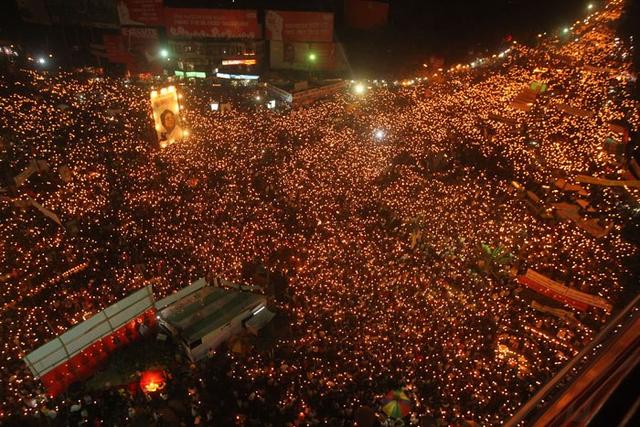Surprising Silence about Shahbag in the US Media
Categories:
- আন্তর্জাতিক
- দেশচিন্তা
- মুক্তিযুদ্ধ
- 1971
- genocide
- Independent war
- International Crime Tribunal
- Shahbag
- War Crime
- সববয়সী
There has been an ongoing massive protest happening in Bangladesh demanding prosecution and ensuring just justice for war criminals of its independence war in 1971. The peaceful protest of unprecedented scale has been taking place for the last eighteen days. The voices of Bangladesh have been tirelessly showing their conviction in protesting against the verdict of the prosecuted 1971 war criminal Abdul Quader Mollah. The verdict was announced on February 5th, 2013 and it has been broadly deemed to be too lenient. The smile and victory sign shown by Quader Molla to the journalists will make anyone search for the deeper context of this verditct. But it was a little too much for the Bangladeshi people who have been agonizingly waiting for the last 42 years to finally have some justice. Within hours, hundreds and thousands of spontaneous protesters gathered together in a central crossing of Dhaka city, known as Shahbag square.

During the 9 month long Liberation War in 1971, heinous atrocities of unthinkable magnitude were committed by Pakistani army along with their local collaborators - the pro-Pakistani political party in Bangladesh - "Jamaat-e-Islami”. The Bangladeshi collaborators of Pakistani army was known as "Razakars". They also formed a para-military group to actively participate in the atrocities. During the nine month of genocide, which was one of the worst genocides of 20th century, some three million people were killed, nearly quarter million women were violated and over 10 million people were forced to take refuge in India to escape brutal persecution at home. The perpetrators of the crimes could not be brought to justice, and this left an unfathomable abrasion on the country's political awareness as well as the whole nation. Bangladesh also had to deal with thousands of war children in the aftermath. The initiative to prosecute the Bangladeshi war criminals started in 1973. The newly independent government of Bangladesh passed a law called the International Crimes (Tribunals) Act (ICT Act 1973) to investigate and prosecute the persons responsible for genocide, crimes against humanity, war crimes and other crimes under international law committed in 1971. The act was a complete law in itself. But the barbaric assassination of the father of the nation Sheikh Mujibur Rahman along with his 24 family members in 1975, stopped the process. The subsequent military rulers in Bangladesh rehabilitated the people accused of, and in some cases, convicted for crimes against humanity. The impunity the war criminals enjoyed held back political stability, facilitated rise of militancy, and helped in the degradation of the nation's constitution with the inclusion of communalism. Some of the war criminals were top leaders of the political party Bangladesh Jamaat-e-Islami. By using the veil of a religious identity and Bangladeshi people's religious sentiment, Jamaaat-e-Islami, along with its leaders accused of crimes against humanity managed to create massive vandalism, killing, political unstability as well as produced religious extremists. In 2008, Bangladesh Awamy league came to power with landslide mandate with the promise of finally prosecuting the war criminals. In 2010 the international war crime tribunal (ICT) of Bangladesh started its work. Since the tribunal started its proceedings, numerous effort has been made to derail the process. Jamaat-e-Islami hired Cassidy and Associates to lobby in the United States congress and has been pouring millions of dollars to the lobbying firm. The peace-loving general mass of Bangladesh, especially the patriotic youth, desperately needing a closure on the wounds of war, were holding their breath towards the verdict against the war criminals.

On February 5th, with the verdict of Quader Mollah, people just burst out with anger and rage and came down to street at Shahbag square. Given the level of crime committed by Mollah, including killing of 344 civilians, rape (including the rape of minors) dozens of women; abetting the Pakistani army; actively participating in the 1971 atrocities in Bangladesh, Bangladeshi people think that his sentence was too little too late. The outpour of emotion brought everyone out to street just like it happened to the Egyptian people in Tahrir Square. They were afraid that with the change of political power, these people will again get out from their life imprisonment and may even become cabinet members.
Hundreds of thousands of protesters have been literally sitting in at Shahbag square day in and day out demanding just justice for the victims of 1971. This protest has been completely apolitical and nonviolent, seeking to ensure that justice is done in the proper way. On the third day of the protest, the young people stood in silence for three minutes from 4:00 pm to 4:03 pm. The whole country came to a stand still. Everywhere people stopped their work and stood in silence to show their solidarity with the youth protested in Shahbag. On February 14, the protest movement held a candle-light vigil. The world has probably not seen such a remarkable sight of peaceful protest.

The event has not gotten much attention in the American media. BBC has covered it. So has the Guardian. There have also been a couple of CNN i-reports. It is very difficult for any outsider to fathom the deep emotion associated with this protest movement. The language of the protest seeking capital punishment for the convicted war criminals has probably been at odds with some of the western media. But anyone who has visited Shahbag will bound to realize what a remarkable story it is. This is a story of the youth, the next generation, it is a story of the power of social media, and above all it is a story of our innate search for justice. People of Bangladesh are peace loving and against all extremism.
It is indeed surprising that the US media has been sleeping through the whole period. One must wonder what could be the reason for this apparent apathy. CNN made several reports on the Tazreen Fashions fire accident, but no big report yet on the up rise of hundreds of thousand of mass people on a serious issue like trial of a genocide criminals. In Bangladesh, the whole nation is fighting to ensure true justice for the 1971 war criminal and made a 19 day long "Tahrir square" movement on "No to Fundamentalism" but MSNBC made a two paragraph story about Blogger's death rekindles anti-Islamist protests in Bangladesh in its technology section. Could it be, could this possibly be that all the money that Jamaat has been spending all around the world, has also managed to buy the silence of the journalist leaders of the free world.
References:
1 http://en.wikipedia.org/wiki/Shahbag_protest
2. http://bangla2000.com/blog/shahbag-2013/
3. http://www.flickr.com/photos/mehdihasan/sets/72157632699181848/
4. http://bangla2000.com/blog/shahbag-2013/photos/
5. http://www.flickr.com/photos/enamulhoque1/sets/72157632724551111/
6. http://thoughtmarrow.wordpress.com/2013/02/09/135/

Comments
It's really frustrating to see US Media's silence on the one of the most excellent movements of this century. They were crazy about the half cooked movement in Egypt, which later got hijacked by a fundamentalist organization Muslim Brotherhood. While the west always cries for secularism, abolition of fundamentalism and promise for freedom, it's surprising silence towards Bangladeshi youth's uprising against fundamentalism makes me wonder do they really mean what they utter!
It might even be the case that to be counted to Western media you either have to have a lenient policy toward the terrorists (like most arab countries and Pakistan) or have nukes (like Pakistan) or oil(like Lebanon). In any case, it's a shameful journalism policy adopted by US media.
Great writeup! There is a minor typo, when you mentioned about a 3 minutes' silence from 4.00 to 4.30PM, I guess that would be 4.00 to 4.03 PM.
---
মানুষ তার স্বপ্নের সমান বড়
Thanks. I will try to add your points here. And also thanks to point out the typo. I will fixed it.
A nice writeup including all relevant history. But, it would be nicer if it could also include a comparative figure of news on Bangladesh of other issues which got US media interest within this time.
Watching some US media like CNN, and of course learning from friends in US - there is an idea that US media is too concentrated by their own news, and, they try to keep their citizens away from the rest of the world. In this context, if other issues from Bangladesh (i.e. garment fire) get US media coverage but not the most important one (i.e. Shahbag) than it would be easier to point to the money spend by Jamaat for govt. lobbyist and other media purchases.
________________________________
সমস্যা জীবনের অবিচ্ছেদ্য অংশ; পালিয়ে লাভ নাই।
Thank you so much for your insightful thoughts and suggestions. Yes you are right. I should have added those points to make my argument strong. I will add the photo you provided in to the main article.
Post new comment